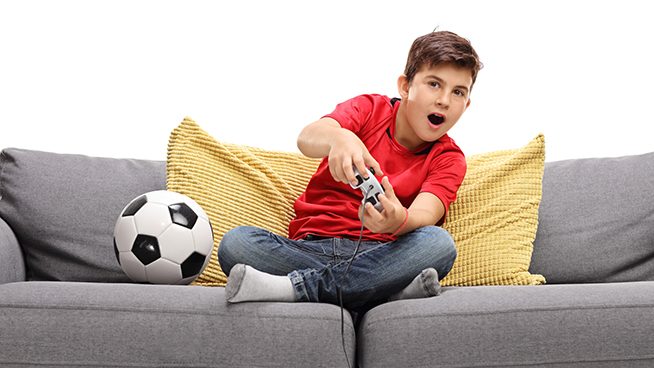7 Unhealthy Habits to Stop to Improve your Kids Fitness
Nobody’s perfect. While we might have good intentions when signing our kids up for sports, we can’t resist giving in to a few sweet treats or lazy days once in a while. As long as you have good intentions and teach your kids the benefits of a healthy lifestyle, it’s usually possible to work around these little slip ups.
However, there are some unhealthy habits that could be damaging to your kids’ fitness, and you might not even realize you’re doing them. These are small things that often get overlooked, but with a few small tweaks, you could see huge improvements in the health of your kids.
1. Carrying heavy backpacks
At school, it’s not always seen as cool to wear a backpack correctly, but this is a crucial factor in keeping your kids fit and free from injury. Choose a bag with wide straps and padding, then adjust it so that it sits closely around the center of the back. The National Posture Institute says that a backpack should weigh no more than 15 percent of a child’s weight, so keeping your kids’ bags light will prevent serious musculoskeletal injuries.
2. Unhealthy eating
Avoiding junk food and choosing a balanced diet is important, so try to pick foods that will benefit your kids’ sporting habits: Carbs are great for slow-release energy, protein helps with building strength, and potassium-rich foods like bananas help to boost endurance.
3. Making excuses
You tell friends that you’re busy this weekend when all you want to do is stay in and watch films; you say something’s come up last minute when you realize that your bank balance is running low. We all make excuses for getting out of things, but this rubs off on kids. You might not let your kids get out of going to practice, but as long as they think making excuses is normal and acceptable, they can make excuses for their performance and attitude. This has a direct effect on your kids’ enthusiasm, success and ultimately their fitness levels.
4. Leading a busy lifestyle
It’s better to be busy than lazy, but there are limits. Pack your children’s schedules full of school clubs, sports and homework, and there will be no time left for relaxation. It’s important to let kids make their own fun and do their own exercise through play—both for their health and for their development. By keeping your kids too busy, they could end up burning out, leaving their bodies unhealthy and inefficient.
5. Trying new gadgets
Whether you like it or not, peer pressure and advertisements both play a massive part in your kids’ interests and activities. It might be popular to try out the latest gadget or game, but don’t jump straight on the bandwagon. Hoverboards are a prime example: Their popularity sky-rocketed when they were new, but numerous design problems led them to explode and malfunction dangerously. Now that time has passed, these issues have been resolved, resulting in better and safer products. Take your time to do your research and find the safest options which actually benefit your children’s health.
6. Bad sleeping patterns
High sugar levels and too much screen time are just two reasons why kids might experience insomnia and other sleep problems. Tired children are more likely to experience issues with concentration, mental health, growth, weight gain and their immune systems than kids who are well-rested. Getting a good night’s sleep is critical to the overall health, fitness and well-being of your kids, so aim for at least 11 hours a night for preschoolers and even more for toddlers.
7. Using too much technology
These days, kids learn to use technology at such a young age that they spend their whole lives texting, playing video games and staring at screens. This is a fairly new phenomenon as kids today are the first generation to encounter so much technology, but the problem is that their bodies aren’t built for this kind of activity. Even if you limit their screen time already, teach your kids good posture and the importance of taking regular breaks to avoid joint and muscle problems which could have a serious impact on their fitness.
Conclusion
We’re all human. We all make mistakes. We all have bad habits, and as hard as we try, we do pass some of these on to our kids. The sooner that you’re aware of these unhealthy habits, the sooner you can stop that behavior and improve your kids’ fitness. Ignore the bad habits until they die out, praise and encourage healthy habits, and educate your children on the importance of healthy living to improve their health, well-being, efficiency and fitness.
READ MORE:
- What Parents Need to Know About Their Kid’s Strength Training Program
- Should My Kid Play Multiple Sports?
- Why Fun Should Be the Focus of Youth Sports
- 10 Signs You’re a Horrible Sports Parent
yacobchuk/iStockPhoto, Ljupco/iStockPhoto
RECOMMENDED FOR YOU
MOST POPULAR
7 Unhealthy Habits to Stop to Improve your Kids Fitness
Nobody’s perfect. While we might have good intentions when signing our kids up for sports, we can’t resist giving in to a few sweet treats or lazy days once in a while. As long as you have good intentions and teach your kids the benefits of a healthy lifestyle, it’s usually possible to work around these little slip ups.
However, there are some unhealthy habits that could be damaging to your kids’ fitness, and you might not even realize you’re doing them. These are small things that often get overlooked, but with a few small tweaks, you could see huge improvements in the health of your kids.
1. Carrying heavy backpacks
At school, it’s not always seen as cool to wear a backpack correctly, but this is a crucial factor in keeping your kids fit and free from injury. Choose a bag with wide straps and padding, then adjust it so that it sits closely around the center of the back. The National Posture Institute says that a backpack should weigh no more than 15 percent of a child’s weight, so keeping your kids’ bags light will prevent serious musculoskeletal injuries.
2. Unhealthy eating
Avoiding junk food and choosing a balanced diet is important, so try to pick foods that will benefit your kids’ sporting habits: Carbs are great for slow-release energy, protein helps with building strength, and potassium-rich foods like bananas help to boost endurance.
3. Making excuses
You tell friends that you’re busy this weekend when all you want to do is stay in and watch films; you say something’s come up last minute when you realize that your bank balance is running low. We all make excuses for getting out of things, but this rubs off on kids. You might not let your kids get out of going to practice, but as long as they think making excuses is normal and acceptable, they can make excuses for their performance and attitude. This has a direct effect on your kids’ enthusiasm, success and ultimately their fitness levels.
4. Leading a busy lifestyle
It’s better to be busy than lazy, but there are limits. Pack your children’s schedules full of school clubs, sports and homework, and there will be no time left for relaxation. It’s important to let kids make their own fun and do their own exercise through play—both for their health and for their development. By keeping your kids too busy, they could end up burning out, leaving their bodies unhealthy and inefficient.
5. Trying new gadgets
Whether you like it or not, peer pressure and advertisements both play a massive part in your kids’ interests and activities. It might be popular to try out the latest gadget or game, but don’t jump straight on the bandwagon. Hoverboards are a prime example: Their popularity sky-rocketed when they were new, but numerous design problems led them to explode and malfunction dangerously. Now that time has passed, these issues have been resolved, resulting in better and safer products. Take your time to do your research and find the safest options which actually benefit your children’s health.
6. Bad sleeping patterns
High sugar levels and too much screen time are just two reasons why kids might experience insomnia and other sleep problems. Tired children are more likely to experience issues with concentration, mental health, growth, weight gain and their immune systems than kids who are well-rested. Getting a good night’s sleep is critical to the overall health, fitness and well-being of your kids, so aim for at least 11 hours a night for preschoolers and even more for toddlers.
7. Using too much technology
These days, kids learn to use technology at such a young age that they spend their whole lives texting, playing video games and staring at screens. This is a fairly new phenomenon as kids today are the first generation to encounter so much technology, but the problem is that their bodies aren’t built for this kind of activity. Even if you limit their screen time already, teach your kids good posture and the importance of taking regular breaks to avoid joint and muscle problems which could have a serious impact on their fitness.
Conclusion
We’re all human. We all make mistakes. We all have bad habits, and as hard as we try, we do pass some of these on to our kids. The sooner that you’re aware of these unhealthy habits, the sooner you can stop that behavior and improve your kids’ fitness. Ignore the bad habits until they die out, praise and encourage healthy habits, and educate your children on the importance of healthy living to improve their health, well-being, efficiency and fitness.
READ MORE:
- What Parents Need to Know About Their Kid’s Strength Training Program
- Should My Kid Play Multiple Sports?
- Why Fun Should Be the Focus of Youth Sports
- 10 Signs You’re a Horrible Sports Parent
yacobchuk/iStockPhoto, Ljupco/iStockPhoto













